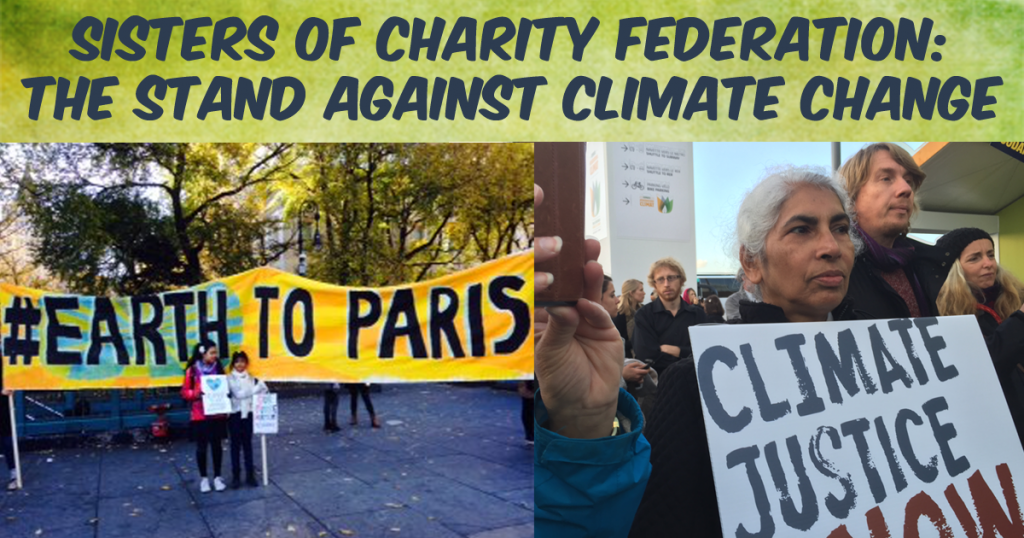
The stand against climate change
Written by Krishna Magalona, Intern with the Sisters of Charity Federation from the College of Mount Saint Vincent
The road to Paris has been a long one, faced with global and local difficulties. The 2015 Paris Climate Change Conference, also known as COP21, aims to create a universal and applicable legal and non-legal instrument with the UN Framework Convention on Climate Change (UNFCCC) to reduce greenhouse gas emissions. Over 190 countries are gathered to reach a new global agreement and address this threat to “our common home.” COP 21 is the conversation we have been waiting for. Pope Francis urges for a conversation that “includes everyone, since the environmental challenge we are undergoing, and its human roots, concern and affect us all.”
Climate change is a prominent issue in our time. It can potentially cause malnutrition among 600 million people by 2080 and can negatively impact crops, livestock, and marine life. Pope Francis writes, “A very solid scientific consensus indicates that we are presently witnessing a disturbing warming of the climatic system. In recent decades this warming has been accompanied by a constant rise in the sea level and, it would appear, by an increase of extreme weather events, even if a scientifically determinable cause cannot be assigned to each particular phenomenon.”
We have already witnessed climate change’s dangerous impacts. Two years ago, the Philippines were devastated by Typhoon Haiyan. This left 6,300 people dead, 1.1 million damaged homes, and 4.1 million people displaced. Hurricane Sandy was a local impact of climate change. This superstorm affected 24 states in the United States and the damage cost amounted to $71.4 billion. The intensity of these extreme and violent weather events can be attributed to the drastic changes in our environment due to “our irresponsible use and abuse of the earth.”
By 2020, the current commitments regarding greenhouse gas emissions will come to an end. Therefore, countries must rally together at this conference to establish plans for the decades to come. Pope Francis’s Encyclical, Laudato Si, addresses the moral obligations that we have as human beings: “The destruction of the human environment is extremely serious, not only because God has entrusted the world to us men and women, but because human life is itself a gift which must be defended from various forms of debasement.”
Climate change knows no national borders. Pope Francis emphasizes the need to unify under this cause despite ethnic, religious, and political backgrounds. As he says, “All of us can cooperate as instruments of God for the care of creation, each according to his or her own culture, experience, involvements and talents.”
The United Nations made a pivotal move in September with the adoption of the 2030 agenda of Sustainable Development. This agenda aims to integrate climate measures, improve education and awareness on climate change, and solidify relationships between developed and developing countries in improving climate technologies and capacities. COP21 provides a forum for all nations to come together for the greater good. Through this conference, countries will establish resolutions concerning climate change and show the international ties that unify and strengthen us. It is a transformative agenda for people and the planet. The Sustainable Development Goals, if implemented, can protect the environment and create a world free of poverty, hunger and disease. With the closing words of Pope Francis, “Love, overflowing with small gestures of mutual care, is also civic and political, and it makes itself felt in every action that seeks to build a better world.”
ON SOCIAL MEDIA THIS WEEK:
The Federation sought photos and documents of members actively participating in combating climate change. To group them all together, we asked all to use the hashtag #Sisters4COP21. (See the photos that sisters sent in, on the Federation website).







0 Comments